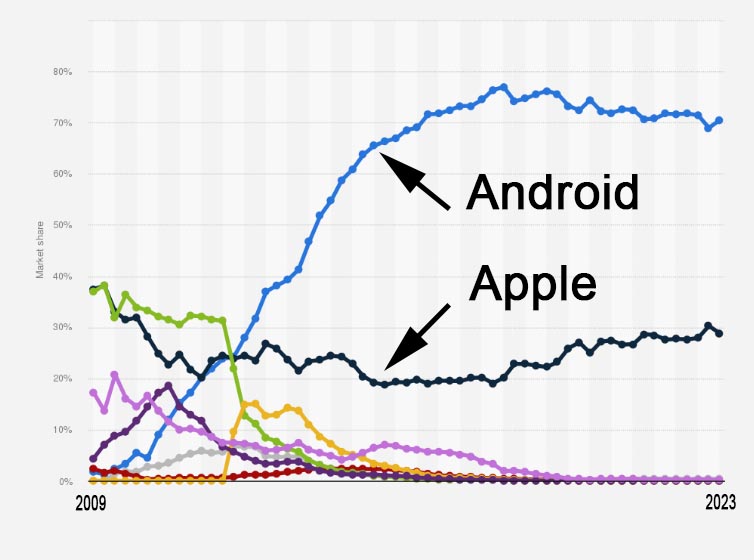Apple adds RCS to iOS (finally)

When Apple Computer, Inc. was founded by college dropouts Steve Jobs and Steve Wozniak on April 1, 1976 its stated goal was to make computers small enough for people to have them in their homes or offices, and it succeeded. Apple continued to create innovative new proprietary products for decades, notably with the June 29, 2007 introduction of the iPhone, along with its mobile operating system, iOS. Unfortunately, Apple also adopted a policy of only supporting their own, proprietary systems, and not adopting competing outside standards.
Unfortunately for Apple iOS users, throughout its history, Apple has continued to aggressively defend their proprietary interests against development of universal standards. In Apple’s case, ‘proprietary’ means that only Apple iPhone, and no other maker, can run the iOS operating system, in practice, this policy has tended to erode their users access to these newer standards, restricting who they can best communicate with to only other Apple users.
In response, Google led a consortium to rapidly develop and release a competing, deliberately more open operating system for mobile devices, universally available to all device manufacturers. They named it Android OS and released the first version on September 23, 2008 and soon many new smartphones from Apple competitors were available, almost all running the Android OS.
Over these past 15 years, Apple has paid a heavy price for their aggressive proprietary stance. As this chart shows, since 2015, iPhone sales have plateaued at about 220 million/year. Worldwide in 2023, Apple’s iOS, has about 1.46 billion active users while the number of users of the competing Android OS have grown to 3.6 billion. As of the third quarter of 2023, Android maintained its position as the leading mobile operating system worldwide with a market share of 70.5 percent. Android’s closest rival, Apple’s iOS, had a market share of 28.8 percent during the same period.
In the world of text messaging there is breaking news. According to a recent report from 9to5Mac, Apple has (finally) announced that sometime in 2024, their iPhones and iPads be updated with support for the Rich Communication Services (RCS) messaging standard, replacing the 40-year-old SMS/MMS texting standard still being used by Apple devices. The backstory on this news is a very good example of how Apple putting their proprietary interests ahead of their users’ best interests, only relenting when there is no viable alternative, has damaged Apple’s reputation for innovation.
Apple devices do use a few open standards, one such is the SMS (Short Message/Messaging Service) that was first developed in 1984. Another is MMS (Multimedia Messaging Service) which was added to it in 2002. As the name implies, this 40-year-old standard is quite restrictive in handling data intensive messages like video clips, which results in poor performance, especially if an iOS user texts an Android OS user.
In contrast, Google and its consortium released the first version of their RCS (Rich Communication Services) on December 15, 2008. RCS offers longer messages, multimedia content sharing, group chats, and read receipts. RCS has been updated regularly. The RCS Universal Profile standard was released in November 2016, and Google began releasing RCS to Android users in 2019.
In my opinion, Apple’s policy of exclusively using Apple proprietary systems has failed the test of time, rapidly aging Apple into the anti-progressive, reactionary weird uncle of the tech world.
